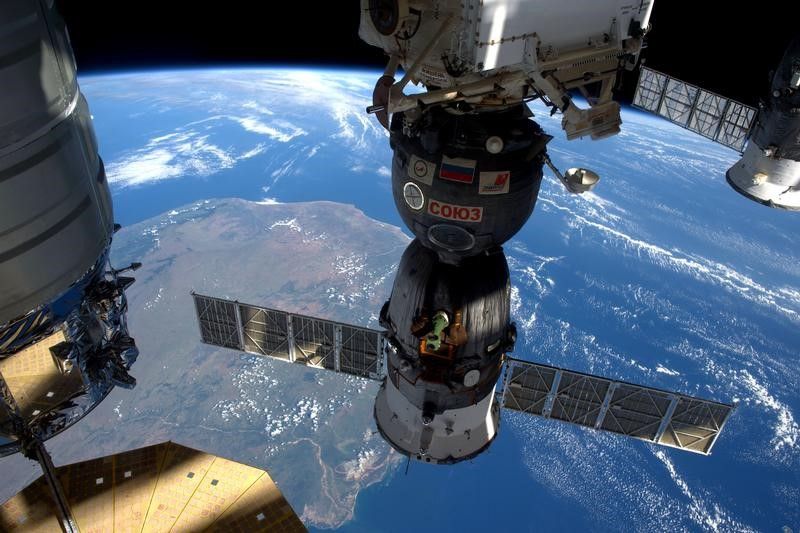
Russia has begun testing samples from the outside of the International Space Station, believing that they may contain traces of extraterrestrial life. In a news release Friday, Russia's space agency, Roscosmos, said it believed that comet dust on the surface of the ISS could include alien microorganisms.
"The micrometeorites and comet dust that settle on the ISS surface may contain biogenic substance of extra-terrestrial origin in its natural form," Roscosmos officials said, as reported by Russian state news agency Tass. "The ISS surface is possibly a unique and easily available collector and keeper of comet substance and, possibly, of biomaterial of extra-terrestrial origin."
The statement added that 19 dust samples have been collected from the surface of the ISS during space walks dating back to 2010 under an experiment known as "Test."
It could be some time before analysts determine the identity of the material, however. Scientists will have to decipher whether the microorganisms came to be on the outside of the space station while structural elements of it were being constructed on Earth or while in space, Space.com reported.
This is not the first time Russian officials have made claims about extraterrestrial life on the ISS. In 2014, the chief of the Russian ISS orbital mission, Vladimir Solovyev, said that sea plankton had been found.
"Results of the experiment are absolutely unique. We have found traces of sea plankton and microscopic particles on the illuminator surface. This should be studied further," he told Tass.
The Russians' American colleagues, though, seemed unaware and skeptical of the discovery.
"As far as we're concerned, we haven't heard any official reports from our Roscosmos colleagues that they've found sea plankton," NASA spokesman Dan Huot told Space.com at the time. "What they're actually looking for is residues that can build up on the visually sensitive elements, like windows, as well as just the hull of the ship itself, that will build up whenever they do thruster firings for things like re-boosts. That's what they were taking samples for. I don't know where all the sea plankton talk is coming from."
Confirming it to be a true international, as well as extraterrestrial, incident, Germany's space agency weighed in on the matter a month later. The German Aerospace Center (DLR) said that while "bacterial DNA" was discovered, the specifics of the claims from its Russian counterpart were considerably more dubious.
"The method by which the samples were analyzed in this case is disputed, as it cannot detect all kinds of bacteria and it also cannot test whether the discovered bacteria are living and thriving or not," DLR spokeswoman Alisa Wilken said.
The ISS was first launched into orbit in 1998 and is a joint project of the space agencies of Russia, the United States, Canada, Europe and Japan.
Uncommon Knowledge
Newsweek is committed to challenging conventional wisdom and finding connections in the search for common ground.
Newsweek is committed to challenging conventional wisdom and finding connections in the search for common ground.
About the writer
Jason Le Miere is from the British island of Jersey, which has absolutely no relation to the Garden State, other than ... Read more
To read how Newsweek uses AI as a newsroom tool, Click here.








